Jammu & Kashmir Switch to Hindi
Pahalgam Terror Attack
Why in News?
Terrorists launched a deadly attack in Anantnag district, Jammu & Kashmir, killing at least 26 people.
- The attack’s timing coincided with the Indian Prime Minister’s visit to Saudi Arabia and the US Vice President J.D. Vance’s tour of India, suggests a deliberate move aimed at sending a provocative geopolitical message.
Key Points
- Brutal Assault in Baisaran Meadows:
- Terrorists attacked a group of around 40 tourists in the Baisaran meadows near Pahalgam.
- Eyewitnesses said the terrorists fired with automatic rifles and small arms, and allegedly checked identities (religion) before shooting victims at close range.
- This is the first major terror attack targeting civilians in Kashmir since the abrogation of Article 370 in 2019.
- Terror Group Claims Responsibility:
- The Resistance Front (TRF), a Lashkar-e-Taiba offshoot, claimed responsibility for the attack.
- TRF opposed the issuance of 85,000 domicile certificates to non-locals or “a pathway for demographic change.”
- Security agencies have not confirmed the authenticity of the claim.
- Strategic Exploitation of Terrain:
- Officials stated that terrorists took advantage of Baisaran’s non-motorable terrain, delaying emergency response.
- The area, though remote, lies within Pahalgam’s high-security zone due to its proximity to the Amarnath shrine.
- Consequences of the attack:
- Security Setback in Kashmir:
- The attack severely dents the narrative of normalcy and stability following the abrogation of Article 370.
- It raises serious concerns over the effectiveness of security measures and exposes vulnerabilities in counterterrorism efforts.
- Blow to Tourism and Local Economy:
- As a major tourist destination, Pahalgam is likely to witness a sharp decline in visitor numbers, especially during the crucial summer season.
- The dip in tourism will directly impact local businesses, hospitality services, and livelihoods that rely heavily on seasonal footfall.
- Diplomatic and International Fallout:
- The attack occurred during the visit of key global leaders, casting India in a light of instability and internal unrest.
- It risks diplomatic unease and may strengthen adversarial propaganda, particularly from Pakistan, on the international stage.
- Risk of Communal Polarization:
- The selective targeting of civilians based on identity hints at an attempt to stoke religious divisions.
- Such actions carry the potential to fuel communal tensions and disrupt the social fabric, which aligns with the terrorist agenda of destabilisation through fear and division.
- Security Setback in Kashmir:
The Resistance Front (TRF)
- Formed in 2019, TRF has emerged as a significant player in the region. It is believed to be a front for Lashkar-e-Taiba (LeT) and has been involved in several high-profile attacks.
Terrorism
- It is the deliberate and unlawful use of violence and intimidation, especially against civilians, to instill fear and achieve political, religious, or ideological goals.
- It seeks to influence governments or societies by creating a climate of fear, disruption, and uncertainty.
- India maintains a strong stance against terrorism with a "zero tolerance" policy.
- However, there are no universally accepted definitions of terrorism, making it difficult to classify specific activities as terrorist acts.
- This ambiguity gives terrorists an advantage and enables some countries to remain silent and veto actions in global institutions.








%20MPPCS%202025%20Desktop%20E.jpg)
%20MPPCS%202025%20Mobile%20E%20(1).jpg)










.png)
.png)











 PCS Parikshan
PCS Parikshan

